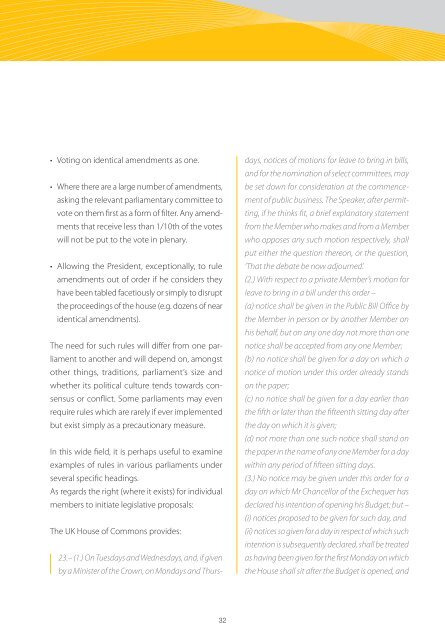Parliamentary Rules of Procedure - European Parliament - Europa
Parliamentary Rules of Procedure - European Parliament - Europa
Parliamentary Rules of Procedure - European Parliament - Europa
You also want an ePaper? Increase the reach of your titles
YUMPU automatically turns print PDFs into web optimized ePapers that Google loves.
• Voting on identical amendments as one.<br />
• Where there are a large number <strong>of</strong> amendments,<br />
asking the relevant parliamentary committee to<br />
vote on them first as a form <strong>of</strong> filter. any amend-<br />
ments that receive less than 1/10th <strong>of</strong> the votes<br />
will not be put to the vote in plenary.<br />
• Allowing the President, exceptionally, to rule<br />
amendments out <strong>of</strong> order if he considers they<br />
have been tabled facetiously or simply to disrupt<br />
the proceedings <strong>of</strong> the house (e.g. dozens <strong>of</strong> near<br />
identical amendments).<br />
The need for such rules will differ from one parliament<br />
to another and will depend on, amongst<br />
other things, traditions, parliament’s size and<br />
whether its political culture tends towards consensus<br />
or conflict. some parliaments may even<br />
require rules which are rarely if ever implemented<br />
but exist simply as a precautionary measure.<br />
in this wide field, it is perhaps useful to examine<br />
examples <strong>of</strong> rules in various parliaments under<br />
several specific headings.<br />
as regards the right (where it exists) for individual<br />
members to initiate legislative proposals:<br />
The UK House <strong>of</strong> commons provides:<br />
23.– (1.) On Tuesdays and Wednesdays, and, if given<br />
by a Minister <strong>of</strong> the Crown, on Mondays and Thurs-<br />
32<br />
days, notices <strong>of</strong> motions for leave to bring in bills,<br />
and for the nomination <strong>of</strong> select committees, may<br />
be set down for consideration at the commencement<br />
<strong>of</strong> public business. The Speaker, after permitting,<br />
if he thinks fit, a brief explanatory statement<br />
from the Member who makes and from a Member<br />
who opposes any such motion respectively, shall<br />
put either the question thereon, or the question,<br />
‘That the debate be now adjourned’.<br />
(2.) With respect to a private Member’s motion for<br />
leave to bring in a bill under this order –<br />
(a) notice shall be given in the Public Bill Office by<br />
the Member in person or by another Member on<br />
his behalf, but on any one day not more than one<br />
notice shall be accepted from any one Member;<br />
(b) no notice shall be given for a day on which a<br />
notice <strong>of</strong> motion under this order already stands<br />
on the paper;<br />
(c) no notice shall be given for a day earlier than<br />
the fifth or later than the fifteenth sitting day after<br />
the day on which it is given;<br />
(d) not more than one such notice shall stand on<br />
the paper in the name <strong>of</strong> any one Member for a day<br />
within any period <strong>of</strong> fifteen sitting days.<br />
(3.) No notice may be given under this order for a<br />
day on which Mr Chancellor <strong>of</strong> the Exchequer has<br />
declared his intention <strong>of</strong> opening his Budget; but –<br />
(i) notices proposed to be given for such day, and<br />
(ii) notices so given for a day in respect <strong>of</strong> which such<br />
intention is subsequently declared, shall be treated<br />
as having been given for the first Monday on which<br />
the House shall sit after the Budget is opened, and

















